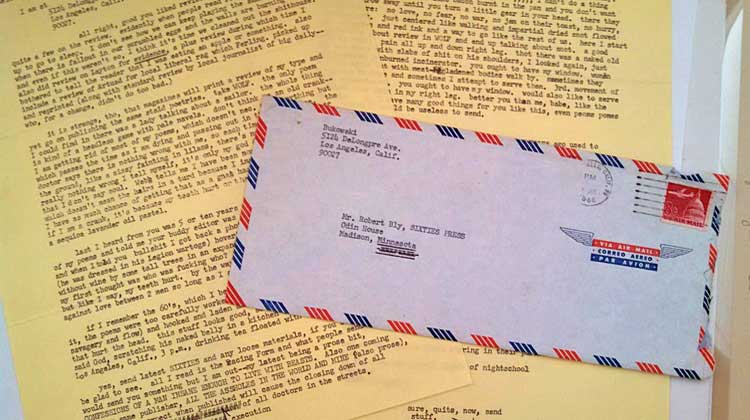
Unlike any other time in U.S. history, the 1950s and ‘60s saw the emergence of multiple literary movements stoked by a flourishing small-press culture. Popular magazines of the time included the New York-based Fuck You founded by Ed Sanders and Floating Bear founded by Diane di Prima and Leroi Jones. This “Mimeo Revolution” (though not every publication used a mimeograph) brought new writers to a wider audience and encouraged discourse on the future of American writing. Though unaffiliated with Black Mountain, the Beat Generation, or the New York School, one prominent publication of the period was Robert Bly and Bill Duffy’s The Fifties in western Minnesota.
The impetus for The Fifties (later called The Sixties and The Seventies) was Bly’s excitement over the poetry of the Spanish Surrealists. Each issue published original translations — including Pablo Neruda and Tomas Tranströmer (both of whom later won the Nobel Prize) — and commentaries on the work of Gary Snyder, James Wright, David Ignatow, and others. The magazine was famously snarky, rejecting traditional forms and university poets, even parodying the likes of Charles Olson and Robert Lowell. Rejection slips were written with a bottle of Jim Beam on the table and often compared poems to false teeth, melted ice cream, and rotten lettuce. It is no surprise then Bly attracted the attention of countercultural icons everywhere – including writer and poet Charles Bukowski.
It is unlikely the two ever met in person, but all the way in Los Angeles, Bukowski was steadily publishing poems and reviews wherever he could. With only a few poetry collections and chapbooks under his belt, he was a year away from the newspaper column that made him famous (“Notes from a Dirty Old Man”) and still working the job he later immortalized in Post Office (1971). In this letter to Bly written in the summer of 1966, he complained about (among other things) the arrogance of writers and the prevalence of “staid poetries.” The Sixties was not immune to this, he added, criticizing Bly’s overlooking poetry that had “savagery and flow,” saying what Bly published “looks good, seems good[,] but it is not good.” To complement this, he included a poem disdainful of those writers who feigned humility and the art schools that encouraged them. Yet, what Bukowski may not have appreciated was that his opinions were not too dissimilar from Bly’s.
The frontispiece of The Sixties announced that “most of the poetry published in America today is too old-fashioned,” which was why Bly turned his attention to translation. Additionally, each volume awarded the Order of the Blue Toad to those the editors believed cheapened poetry. Decades later – in the only issue of The Thousands – this was renamed the Domestic Globalization Award (DGA), which was “given to programs that best embody the principle of globalization, that is, the distribution of identical ready-made articles that result in the destruction of native cultures.” As someone who once included in his writer’s bio the sentiment that “a poet is best off outside the university,” the first and only DGA went to “the 256 chartered writing programs in the United States, which are currently working hard to lower the level of published poetry.” So while Bukowski and Bly may have disagreed in the direction poetry ought to move, they did agree that it had to move – and away from institutions.
Although I was unable to find Bly’s original letter (likely destroyed or lost), one can decipher its content by Bukowski’s response. Besides being of significance to Bukowski fans, this letter marks a unique moment in literary history when two — personally, stylistically — different outsiders crossed paths. In terms of its modern relevance, it should inspire reflection over the state of writing nearly a half-century later. In an environment where young writers are only taken seriously if they have an MFA and are competing for dwindling print-space, could another Bukowski gain traction? Can a writer survive outside the university, “scratching his naked belly in the kitchen”? It is hard to imagine.
Source: Robert Bly Correspondence series (Mss 81_s01), Literary Manuscripts Collection, University of Minnesota Libraries, Minneapolis. Box 11, Folder 4.
July 6, 1966
Los Angeles, Calif.
hello r. Bly:
I am at
5124 DeLongpre Ave.
Los Angeles, Calif.
90027.
all right, good you liked review in WOLF. have heard from quite a few on the review. evidently when people read reviews they are toned up to go to sleep. I don’t see how we can keep playing the same old game when there is fallout in our scrambled eggs and the walls are burning down, and even if this weren’t so, I think it’s time we cleaned out the shithouse. also did review on Layton for evidence, a plus review during which time I bothered to tell the reader that I was eating an apple or something. also include a review of Artuad for local liberal rag which Ferling. picked up and reprinted (along with standard review by local journalist of big daily – who, for a change, didn’t do too bad).
it is strange, tho, that magazines will print a review of my type and yet go on publishing the same staid poetries. take WOLF. the only poem I could find in there was a lady talking about a sailor. the whole thing is kind of a headless game with pale navels. don’t think me an old crank – I am getting rid of most of my poems, which doesn’t nec. mean anything but which passes the time as I am dying and passing out in the sweathouse. the doctor says there is nothing wrong with me, so each time they pick me off the ground, like a sissy fainting in lilacs, there’s nothing wrong there’s really nothing wrong I tell myself, it’s only my god damned MIND. notice that I don’t say soul. Webb tells me I have been nominated for the Pulitzer which doesn’t mean the hairs in a turd because I imagine thousands are, and I have as much chance of getting that as a gnat has of fucking Soph Loren. if I am a crank, it’s because my teeth hurt or the cows come home painted in sequoia lavender oil pastel.
last I heard from you was 5 or ten years ago when you rejected some of my poems and told me your buddy editor was going to join the F. Legion and when I told you bullshit I got back a photo of you and your buddy (he was dressed in his Legion wartogs) hovering blithely over a a small table without wine by some tall trees in an expanded Minnesota breakfastnook, and my first thought was who was fucking who? I didn’t have any second thoughts, but like I say, my teeth hurt. by the way, don’t get me wrong, I am not against love between 2 men so long as I am not one of those 2 men. fine.
if I remember the 60’s, which I believe was called the 50’s when I read it, the poems were too carefully worked (by this I mean they lacked savagery and flow) and hooked and laden and buckling under heavy imagery that hurt the head. this stuff looks good, seems good but it is not good, said God, scratching his naked belly in a kitchen at 5124 Delonpgre Ave, Los Angeles, Calif., 3 p.m., drinking tea floated with cigar ashes …
yes, send latest SIXTIES and any loose materials, if you still will, be glad to see. all I read is the Racing Form and what people send me. would send you something but I am out – my latest being a prose bit, CONFESSIONS OF A MAN INSANE ENOUGH TO LIVE WITH BEASTS. Also one coming up from same publisher, ALL THE ASSHOLES IN THE WORLD AND MINE (also prose), which I fully expect when published will cause the closing down of all hospitals and the execution of all doctors in the streets. write to, if you will, Doug Blaze, c/o OPEN SKULL PRESS, 449 S. Center st., Bensenville, Ohio, and am sure he will get these to you, the one that’s out and the other when it does come. out. tell him the old goat sent you.
sitting here listening to radio, picking up a bit of opera and symphony, some of it doing me some good, kind of like butter, and like butter, this afternoon, staring out the window at the cardboard blue smog mountains and watching the pigeons on lot of green dried grass. pigeons puzzle me like no other life form. spiders my gut can hate out of essence, that’s easy. lions I can like – in photographs. but pigeons ,,,,, I can’t do a thing with them. they are there like bacon burnt in the pan and you don’t want to quite throw away until you turn a little gear in your head. there they are out thereno: no love, no fear, no war, no jam on their toast, no hurry, no not-hurry. just centered like walking and impartial dried snot flowed with arteries and red ink and a way to go like the rest of us. here I start out talking about review in WOLF and end up talking about snot. a good time to stop. pain all up and down right leg. thot there was a naked old man out there with slabs of shit on his shoulders, I looked again, just an abandoned sunburned incinerator. you ought to have my window. women without souls but with meat-ladened bodies walk by. sometimes they even come in here and sometimes I attempt to serve them. 3rd. movement of Rocky concerto on. you ought ot have my window. would also like to serve you with this pain in my right leg. better you than me, babe, like the mob says. o, I have many good things for you like this, even peoms pomes poems, which it would be useless to send.
like those shits in the art class so many years ago used to
act, used to talk to each
other –
ooo, you think it’s good?
oo, it’s nothing, really,
nothing,
o, I was going to throw it
away.
how right they are, I’d think, it is nothing
but then
they won’t throw it
away (my head turning buttermilk thoughts
from my table in rear corner)
the instructor:
Bukowski, what’s that you’re
drawing?
a cat.
but I told you to make a drawing using only
straight lines, angles…
and all the little shits staring in their purified
glory
as the moon and putrid lights of nightschool
found me
fucked up again.
sure, quits, now, send
stuff,
Buk




Leave a Reply